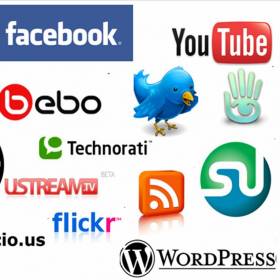Discussion
Report Discussion as Inappropriate / SpamPros and Cons of Social Networking in Schools
Pros: I agree that social networking can be a positive tool used in collaboration and promote collaboration outside of the typical realms. Many of the classes I have taken online have been greatly enhanced by Google + and the ease at which we could "meet." IF students are using the networks appropriately (after being taught appropriate measures), it could definitely change the way they learn and we teach.
Cons:
DISTRACTIONS...Social Networking in the classroom has one major enemy in my mind- the students get too distracted. While they may have the best intentions when logging on, the lure of a waiting message or seeing a friend is online is often too much to resist. I think the best way to battle this is to use tools that limit these distractions.
Pros: I think social networking can have positive effects when used appropriately. When taking classes online social networking can be extremely important when collaborating solely with members online. One way to enhance communication could be through the use of twitter. TweetDeck is a feature of Twitter where you can create a group and monitor the contacts. Important reminders or tweets could be sent out to the group. Group members could also create a group on facebook and communicate that way.
Cons: One major con can be privacy and social networking sites accessing personal information. The users need to be careful when using social media especially because if the privacy settings are public anyone can see the information. As people have already stated it is very easy to waste time on social networking sites instead of doing your work. It is up to the user to be productive and do their assigned work, but this can be very challenging for high school and college students.
Pros: I agree with the posts above. Social networking can be a very positive tool when collaborating with others. Facebook, Twitter, Pinterest, and Youtube are all effective sites for teachers to collect resources and communicate with one another. Many teachers use these social networking sites to collect resources for classroom use and then they may allow the students to use them as well. It is also useful for students who are older to use these social sites because they are most likely already familiar with them.
Con: The major cons are distraction and misuse of sites. For both adults and students these sites can be very time consuming and allow us to "waste time." Users also need to be careful about how they are using the site, and if it is used for the right purpose. Another con is misusing the site. I think that some users just start using the site and are not aware of the precautions. This can lead to computer misuse and frustration for both the adult and student. It can lead users to other sites that are not appropriate or recommended.
Pros:
Social Networking sites can be a powerful tool in education. Each site offers a unique and positive impact in education from integrating real-word application into the classroom, networking, continued professional development, increased parent communication, and community outreach. I use pinterest regularly to help find lessons or ideas to enhance my lessons, find new tools to incorporate into my classroom, and so much more. I have hundreds of pins to help in the classroom.
Cons: One of the major concerns with the various sites is students safety from bullying, harrassment, and sexual predators. These are justified concerns that parents and schools need to take into consideration when implementing these sites into education. Another con is the sites can become addictive and may not always be used in a manner that is beneficial.
PROS:
Researcher have suggested that online social networking allows students to create or redefine their identity (Educause Learning Initiative, 2006). Students have the opportunity to reflect on who they are and how they relate to others through the practice of online social networking (Educause Learning Initiative, 2006). For many students, social networking is an important tool for development.
Con:
While the use of social networking sites is popular with students, parents and school administrators and officials do have deep concerns about certain aspects of these web 2.0 tools. First, protection of privacy is a major concern. All websites are potentially vulnerable to hacking; thus, the identity theft and potential loss of personal information are viewed as issues of valid concern. Many parents are concerned about online predators gaining access to their children via social networking sites because like all online activities, there is no guarantee that the persons behind the profiles on social networking websites are who they claim to be..
PROS:
Social networking teaches students how to be responsible digital citizens. It also promotes communicative literacy because students have to think of ways of getting their ideas and thoughts across various media. This fosters creativity and to think beyond traditions or "outside the box". Moreover, social networking allows for instant student connections. In turn, students expand their network and are able to converse beyond the classroom.
CONS:
Safety and privacy is a major concern for social networking. Teachers who integrate social networking in the classroom must be very cautious and diligent about the kinds of connections students make. This is often hard to monitor because social networking can go beyond the classroom and be used at home. Social networking may also veer students away from the purpose of classroom assignments and objectives and merely use social networking for entertainment.
Social networking can be a great way to communicate with digital-native students because these sites are designed to foster collaboration and discussion.
Pros:
1- Improve Communication Among Students and Teachers:
Teachers can use social media to keep students updated by posting classroom announcements, reminders, and forming discussions. Students can feel free to post questions to the teacher in regard to something that wasn’t understood by them. Other students who also faced similar situations or difficulties might greatly benefit from reading the teachers answer.
2- Enhance Student Engagement:
Students who often feel shy or withhold information during a lesson in fear of saying something wrong will be more comfortable to communicate virtually.
Cons:
1- Social Media can be a Distraction:
This point was stressed out multiple times during this discussion because it is a very big problem that many of us face. Students can easily be distracted when using a social network for educational purposes, anything such as advertisements, messages from other people can hinder the learning.
2- Social Media Can Discourage Face-to-Face Communication:
Students who are uncomfortable expressing themselves will find it challenging to form real social interactions outside of this social network. Constantly using social networks for education may cause students to miss out on developing valuable social skills that are needed for face-to-face interactions with other individuals.
23.01.21.03.10.52 © 2026 Pearce, LLC


Pros:
March 26, 2013, 10:50 pm [ report as inappropriate ]I believe that social networking helps to keep a group of students connected when working on projects remotely. Facebook for instance has a feature where you can create your own group and adjust privacy settings. This way information sharing is safe among group members.
Cons:
Because of the many features offered by social networking sites such as Facebook, group users can become distracted. For instance while the group is engaging in conversation, images are displayed in the newsfeed and private message alerts are sent. The user must be aware of these distractions and proactively ignore the impulse to respond.